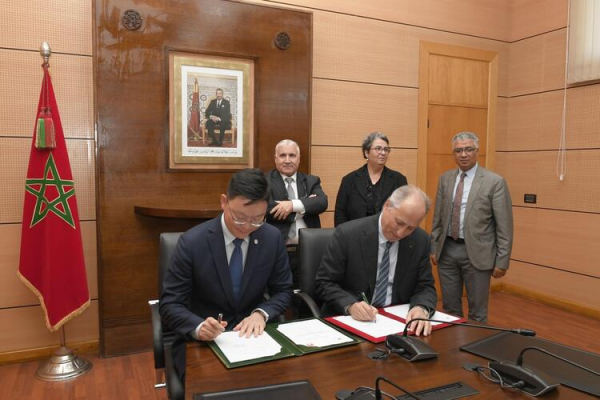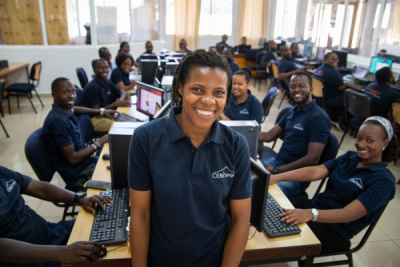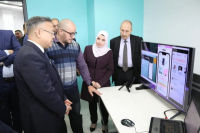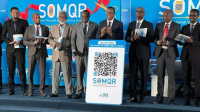Access to financing is a significant barrier to the expansion of small and medium-sized enterprises (SMEs) across Africa. In Nigeria, a startup has emerged to tackle this challenge, concentrating its efforts on the renewable energy industry.
Nigerian fintech startup PayHippo, founded in 2019 by Chioma Ruky Okotcha, Uche Nnadi, and Zach Bijesse, announced Wednesday it has rebranded as Rivy and the closing of a $4 million funding round.
Rivy will use the new capital to expand its offerings and increase its impact across Africa, focusing on providing tailored financing to small and medium-sized enterprises (SMEs) and enhancing risk management through technology.
The Lagos-based company aims to streamline access to financing for African SMEs, particularly those in the renewable energy sector.
"Renewable energy is not just a necessity for today, but an investment in Africa’s future. With over 600 million people in sub-Saharan Africa lacking access to reliable electricity, clean energy solutions are crucial to driving economic growth, improving livelihoods, and combating climate change," said Dami Olawoye, Rivy's CEO.
Rivy leverages data analysis algorithms to assess company creditworthiness, offering loans without the stringent collateral requirements of traditional banks, enabling SMEs to secure funding quickly.
By integrating with various financial data sources, Rivy analyzes business transactions and cash flows in real-time, facilitating rapid credit decisions, customized loan structures, and flexible repayment options.
The startup reports over 5,000 users since its inception, more than $2 million disbursed in renewable energy financing, and over 36,000 loan transactions.
By Adoni Conrad Quenum,
Editing by Feriol Bewa
- Morocco launched the program on March 25, expanding a 2024 pilot to integrate digital tech into education.
- The program will train 1,800 teachers in AI, robotics, and augmented reality.
Morocco's Ministry of National Education, Preschool and Sports, in collaboration with Huawei Morocco, launched the "DigiSchool 2025" program on Tuesday, March 25. Building on the success of its initial phase in 2024, this initiative aims to further integrate digital technologies into the country's education system.
Speaking about the project, Mohamed Saad Berrada, Minister of National Education, stated: “This program develops the digital skills of teachers and students, fosters their spirit of innovation, and broadens their openness to modern technologies. We are working toward a resilient and connected future, with quality public education accessible to all.”
The DigiSchool 2025 program plans to train 1,800 teachers in emerging technologies such as artificial intelligence, robotics, and augmented reality. Simultaneously, 36,000 students will participate in DigiSchool clubs across 248 schools located in Morocco’s 12 regions. These clubs will offer an introduction to future technologies and transversal skills, thereby encouraging innovation among younger generations.
This initiative is part of Morocco’s 2022–2026 roadmap aimed at modernizing its education system, with the objective of preparing a generation of students and teachers to succeed in a digital environment. Through the utilization of public-private partnerships, the program represents a significant step towards a more inclusive and innovative education system.
DigiSchool 2025 also aligns with the national strategy "Morocco Digital 2030," which seeks to position the country as a major technology hub in Africa. Among the key objectives are training 100,000 young people annually in digital professions and creating 240,000 jobs within the digital sector by the year 2030. This initiative thus addresses the growing demand for digital skills while contributing to the development of a qualified workforce prepared to meet the challenges of the digital age.
By Samira Njoya,
Editing by Sèna D. B. de Sodji
With its young population, Africa could emerge as a major player in the global workforce over the next 10 to 15 years. However, to unlock this potential, massive investments in education and training are essential to equip the continent’s youth for the challenges of tomorrow.
More than 4,000 young people across the seven member states of the East African Community (EAC) have acquired digital skills through the “Innovative Skills in East Africa” (dSkills-EA) project. The participating countries include Burundi, the Democratic Republic of Congo, Kenya, Rwanda, South Sudan, Tanzania, and Uganda. The program, supported by German development cooperation through GIZ and implemented by the Inter-University Council for East Africa (IUCEA), aims to enhance youth employability and foster digital innovation within the region.
Launched in 2021, dSkills-EA is scheduled to conclude on March 31, 2025, after a four-year implementation period. In a statement released on Wednesday, March 26, the EAC lauded the project's impact and announced new initiatives to build upon this momentum. “dSkills-EA demonstrates the strength of collaboration between governments, academia, and industry. By equipping thousands of young people with future-proof skills, we have laid the groundwork for a thriving digital ecosystem in East Africa. The EAC AI Regional Alliance will build on this success, expanding AI infrastructure and regional capabilities to secure East Africa’s place in the digital future,” stated David Roos, Director of the dSkills-EA project.
Addressing the Digital Skills Gap
The EAC economy faces challenges related to low productivity and competitiveness, which contribute to high unemployment rates, particularly among young people. According to GIZ, socio-economic development is heavily reliant on innovation and the integration of information and communication technologies (ICT). However, universities still struggle to adequately meet the demands of the private sector and young entrepreneurs.
To address these shortcomings, dSkills-EA introduced short-term training programs tailored to industry needs, provided support to young entrepreneurs in developing digital solutions, and enhanced the master's curriculum in embedded and mobile systems at the Centre of Excellence for ICT in East Africa (CENIT-EA), hosted at the Nelson Mandela African Institution of Science and Technology (NM-AIST). The initiative brought together over 300 private partners and 100 universities, establishing a solid foundation for digital transformation in East Africa.
A Critical Issue for Africa's Future
According to a study by the International Finance Corporation (IFC), 230 million jobs in Africa will require digital skills by the year 2030. Yet in 2022, the continent registered a digital skills gap index between 1.8 and 5, significantly below the global average of 6, according to the World Bank. The institution also noted that 12 of the 20 countries with the lowest levels of digital skills are located in Africa, hindering the growth of a competitive digital economy.
Initiatives like dSkills-EA are crucial for bridging this gap and preparing Africa’s youth for the jobs of the future. By offering targeted training aligned with market needs, dSkills-EA enables young people to quickly enter the workforce by providing them with the technical and practical skills necessary for fast-growing sectors.
By Samira Njoya,
Editing by Sèna D. B. de Sodji
- The government plans to launch a national digital platform to improve access to public services.
The platform will integrate services from sectors including insurance, as part of wider public service digitalization.
The Mauritanian government is preparing to launch a national digital platform, an initiative aimed at bringing public services closer to citizens through digital means, officials announced on Wednesday.
The announcement was made during a consultative meeting on March 26 between government authorities and stakeholders in the insurance sector, whose services will be integrated into the upcoming platform, according to the Ministry of Digital Transformation and Public Administration Modernization.
This move is part of ongoing efforts to enhance public service delivery through digital tools. In this vein, the Mauritanian government launched a project last January called “Digital-Y.” The project, financed to the tune of 4 million euros and carried out in partnership with German development cooperation, aims to integrate digital tools into public management to modernize services, strengthen administrative transparency, and boost economic and social development.
Meanwhile, Mauritania ranked 165th globally in the United Nations’ 2024 E-Government Development Index. The country scored 0.3491 out of a possible 1, a figure well below the African average of 0.4247 and the global average of 0.6382. In terms of online service development, Mauritania remains at an early stage, with a score of 0.1688 out of 1, compared to an African average of 0.3862 and a global average of 0.5754.
However, the Mauritanian government's ambition to improve public service access through digital means may face challenges, including limited internet access. According to the International Telecommunication Union (ITU), approximately 55.6% of Mauritania’s estimated 5 million citizens did not use the internet in 2023.
By Isaac K. Kassouwi,
Editing by Sèna D. B. de Sodji
Senegal aims to become a leading tech hub in Africa by 2034. To bring this vision to life, the government is strengthening strategic partnerships with key players to fast-track its digital transformation.
The Senegalese government is considering a collaboration with Chinese technology firm Huawei to bolster its digital transformation strategy and modernization projects, officials said on Wednesday.
The potential partnership was discussed during a meeting on Tuesday, March 25, between Alioune Sall, Senegal's Minister of Communication, Telecommunications and Digital Affairs, and Shen Li, President of Huawei for West, North and Central Africa.
Discussions during the meeting centered on various aspects of Senegal's digital overhaul, including enhancing connectivity through high-speed networks, deploying 5G technology, and establishing digital platforms and sovereign cloud services. Digital inclusion was also a key topic, with a proposal to make smartphones available for as low as 8,000 West African CFA francs (around $14) to broaden access to connectivity for all Senegalese citizens.
Huawei emphasized its commitment to accelerating the digitization of public services and modernizing the country's digital infrastructure, while also expressing its intent to work with the local private sector to support this initiative.
The meeting is part of the Technological New Deal, a strategic program that outlines Senegal's new digital vision. The plan aims to structure the digital sector and centralize technology governance to improve the efficiency of public services and foster an inclusive digital transition. Key objectives of the program include digitizing 90% of public services by 2034, training 100,000 digital experts, creating tech centers of excellence, and ensuring the security of sensitive data within Senegal.
Huawei already has a significant presence in Senegal, having contributed to major projects in the telecommunications sector and in the training of local information technology talent. This recent meeting signals a potential for stronger collaboration and joint initiatives to support the country's economic growth, particularly through the successful implementation of the New Deal for Technology
By Samira Njoya,
Editing by Sèna D. B. de Sodji
Lagos, one of Africa’s fastest-growing megacities, is notorious for heavy traffic congestion and road safety challenges. Introducing e-police and speed limit cameras is a critical step toward improving road safety, reducing accidents, and enforcing traffic laws more effectively.
The Lagos State Government has announced plans to install 3,000 e-police and speed limit cameras across the state to enhance traffic law enforcement and improve road safety. The Director of the Lagos State Vehicle Inspection Service (VIS), Engr. Akin-George Fashola disclosed this on March 25 during a discussion on Lagos Transport Trends and Perspectives, a program sponsored by the State’s Ministry of Transportation on Traffic Radio 96.1 FM.
According to Engr. Fashola, speed limit cameras have already been installed at key locations such as Alapere-Ogudu Road, where the speed limit is 80km/h inbound Alausa and 60km/h inbound Iyana Oworo, and Mobolaji Bank Anthony Way, which has a 60km/h limit. Meanwhile, e-police cameras are operational at Allen Junction and Nurudeen Olowopopo Road in Ikeja to monitor red light violations and other infractions.
The penalty for violating speed limits has been set at ₦50,000 ($32.5), though offenders who believe they were wrongly fined can contest the charge by providing proof. Engr. Fashola clarified that the initiative applies to all road users, including commercial vehicle operators.
In Q3 2023, the National Bureau of Statistics reported that speeding was responsible for 56% of road accidents in Nigeria, making it the leading cause of traffic fatalities. The high rate of accidents caused by speeding underscores the urgent need for stricter traffic enforcement measures. By leveraging technology to monitor and penalize traffic violations, authorities can enhance road safety, reduce fatalities, and promote compliance with speed limits.
Hikmatu Bilali
Sonatel has been driving Senegal’s digital transformation for several years. Following a recent agreement between its foundation and the Ministry of National Education, the group is now partnering with another state institution.
Sénégal Numérique (SENUM SA) and Sonatel, the owner of telecom operator Orange, announced a partnership agreement on Tuesday, March 25, to support Senegal's digital transformation. The two entities will combine their resources and expertise to develop innovative digital services and improve connectivity nationwide.
"This collaboration aims to accelerate Senegal's digital transformation by focusing on four key areas: strengthening infrastructure for reliable connectivity, developing sovereign cloud and data center solutions, digitalizing public services, and supporting innovation and citizen training," the group stated.
According to details shared on national television (RTS), the agreement includes interconnecting the two entities’ submarine cables to enhance the resilience of digital infrastructure; reactivating the SENIX internet exchange point to improve data traffic management and bolster digital sovereignty; and interconnecting the Sénégal Services and Orange Digital Service hubs to improve access to both public and private digital services. It also includes the implementation of an e-certification system to ensure traceability and compliance in environmental initiatives.
The partnership is part of Senegal’s new digital strategy, which aims to modernize public administration, strengthen digital sovereignty, and promote digital inclusion. It seeks to address challenges related to connectivity and access to digital services, which are essential for economic and social development.
The success of the partnership will depend on the concrete implementation of the planned initiatives. Challenges remain, particularly regarding infrastructure, digital skills training, and network coverage in rural areas. Regulation and governance of this public-private partnership could also present issues.
In the long run, this collaboration could foster the emergence of a dynamic digital ecosystem in Senegal, attract investment, and boost the country’s competitiveness in the tech sector.
By Adoni Conrad Quenum,
Editing by Feriol Bewa
Benue State, like the federal government, is emphasizing digital transformation. To this end, the state entered into a partnership with Huawei in November 2024.
Benue State announced this week that it is committing to training 40,000 civil servants in digital tools and ICT skills. The Nigerian Data Protection Commission (NDPC) will be among the entities providing part of this training.
The program aims to equip civil servants with the skills to effectively utilize the platforms implemented by the state government to support its digital transformation efforts. These solutions include an electronic document management system, a geographic information portal, a start-up support platform, and a dedicated website for the Office of the Head of Service of the State.
"Through this training, we are fostering a future-ready workforce capable of adapting to the demands of a rapidly evolving world," said Hyacinth Iormem Alia, Governor of Benue State. This perspective is also supported by the Organisation for Economic Co-operation and Development (OECD), which shares this vision in its recommendations.
In its report titled "Developing skills for digital government: A review of good practices across OECD governments," the organization states that “to support the shift to digital government, countries must invest in developing the skills of civil servants.”
The OECD further notes that digital technologies have had—and will continue to have—a profound impact on economies, labor markets, and societies. This trend is echoed by the World Bank, which forecasts that nearly 230 million jobs in Sub-Saharan Africa will require digital skills by 2030.
By Isaac K. Kassouwi,
Editing by Sèna D. B. de Sodji
Digital technology is a cornerstone of the Algerian government's vision for socioeconomic development. The administration has even made innovation a top priority in its development strategy.
Algeria's Minister of Higher Education and Scientific Research, Kamel Baddari (pictured, left), on Tuesday, March 25, oversaw the launch of three new digital platforms at the Centre for Research on Scientific and Technical Information (CERIST) in Algiers. These strategic infrastructures include a cloud computing platform, a drone design and control system, and a business incubator designed to support innovation and entrepreneurship.
"These new achievements strengthen the information society and the digital economy while reinforcing Algeria's digital sovereignty. The cloud computing platform will offer advanced data hosting and high-speed processing services while ensuring optimal security," Kamel Baddari stated during the inauguration. He also highlighted the incubator, which plans to host 20 startups by the end of the year, with the goal of reaching 100 new companies annually starting in 2027.
This launch is part of a broader digital transformation strategy undertaken by the Algerian government. It follows other similar initiatives, such as the rollout of digital platforms for publishing scientific research in the medical field and managing university incubators. With these new infrastructures, CERIST aims to develop autonomous and high-performance technological solutions, leveraging advances in 4G and open-source software like Linux, OpenStack, and Kubernetes.
These platforms are expected to serve as a growth driver for Algeria by promoting research, entrepreneurship, and job creation. The cloud platform is set to provide advanced data storage and processing capabilities, while the drone-focused platform is expected to boost research and industrial applications across several sectors, including agriculture and surveillance. As for the incubator, it represents a key lever for technological entrepreneurship, offering Algerian startups the tools and resources needed to innovate and access both national and international markets.
By Samira Njoya,
Editing by Sèna D. B. de Sodji
A robust national payment infrastructure facilitates secure, real-time transactions, which is essential for economic recovery and international trade. By reducing reliance on cash, enhancing security, and expanding financial access, this system will unlock new economic opportunities,
Somalia has successfully launched its first nationwide Instant Payment System (SIPS) under the Somalia Payment Switch (SPS), a payments infrastructure operated by the Central Bank of Somalia (CBS). This marks a major step in modernizing Somalia’s payment infrastructure, enhancing financial inclusion, and strengthening economic stability.
To facilitate this transition, the SmartVista platform by digital payment solutions provider Banking Payments Commerce (BPC) was chosen for its ability to comply with both local and international regulations while enabling seamless connectivity between banks and financial service providers.
The Instant Payment System introduces real-time transactions and QR-based payments, allowing Somali consumers to make instant, secure transfers through their mobile or banking apps using PIN or OTP authentication. At the core of this transformation is SOMQR, Somalia’s national QR payment standard, which facilitates seamless and interoperable digital transactions across the country.
The system includes key features such as a Participant Portal for real-time transaction monitoring, an Integration Platform for seamless financial connectivity, and a Dispute Portal for resolving transaction issues efficiently. Additionally, a Fraud Management Solution will transition from a cloud-based system to a local data center, further enhancing security and compliance. With Public Key Infrastructure (PKI) in place, unauthorized access and fraudulent transactions will be significantly minimized.
The launch of Somalia’s Instant Payment System (SIPS) directly addresses the country's low banking penetration and financial exclusion challenges. The United Nations Industrial Development Organization (UNIDO) highlights in its 2020 ‘Somalia Financial Sector Technical Report’ that only about 15 percent of Somalia's population has a bank account, and fewer than 5 percent of these account holders actively use their accounts. With only 15% of the population holding a bank account and fewer than 5% actively using them, the Somalia Payment Switch (SPS) and QR-based payments will provide a seamless, digital alternative to cash transactions.
By enabling instant, secure transfers via mobile and banking apps, this initiative will bridge the gap between the unbanked population and formal financial services, accelerating Somalia’s digital financial transformation.
Hikmatu Bilali
More...
The ride-hailing market in Tunisia has seen significant growth. However, the recent suspension of several platforms, most notably Bolt, has brought to light the difficulties faced by drivers and the local economy. This situation has created uncertainty about the future of the sector.
Tunisia's Interior Ministry announced on Monday, March 24, the suspension of ride-hailing taxi apps in the country, citing an investigation into money laundering and tax fraud. According to Tunisian authorities, the companies involved were operating without legal licenses and transferring funds abroad through bank accounts that did not comply with local regulations. While the official statement did not explicitly name any specific company, a source familiar with the matter confirmed to AFP that Estonian-based Bolt was the primary target of the decision.
Bolt Drivers Face Uncertainty
Bolt, which began operations in Tunisia in 2019, quickly gained a significant share of the market, particularly in major cities such as Tunis and Sfax. The app enabled thousands of drivers to become self-employed and establish this activity as their primary source of income. Industry estimates suggest that over 5,000 drivers were registered on the platform in Tunisia. The suspension of the app has plunged these workers into a state of uncertainty, raising the risk of further increasing the country's unemployment rate. According to the National Institute of Statistics, Tunisia's unemployment rate stood at 16% in the third quarter of 2024.
Furthermore, most Bolt drivers do not possess traditional taxi licenses and cannot easily transition into the formal transport sector. The economic impact is also being felt by those who invested in vehicles for this activity, often with outstanding loans. In addition, the app's suspension has created a gap in the urban transport sector, where alternatives such as traditional taxis are often criticized for their unreliability and lack of regulation.
Impact on Users and the Local Ecosystem
The arrival of ride-hailing services helped address the shortcomings of often-inadequate public transport in Tunisia. Many Tunisians embraced on-demand taxis for their daily commutes, drawn by their reliability and competitive pricing. This sector responded to a growing need for quality transport, especially in urban areas where public infrastructure remains limited.
The halt in ride-hailing operations has consequences that extend beyond users. This decision affects the entire economic ecosystem tied to the sector. Gas stations may experience a drop in fuel consumption, while car dealerships and rental agencies risk losing valuable clientele. Additionally, small entrepreneurs specializing in ancillary services such as car washing and maintenance will see their businesses significantly shrink.
Legal Vacuum and Government Ambitions
The suspension of Bolt and other operators highlights the lack of clear regulation surrounding ride-hailing apps in Tunisia. Unlike other countries where legal frameworks have been established to oversee such platforms, Tunisia has struggled to define clear rules. Some observers believe the government could use this situation to launch a domestic alternative. In January, the government announced plans to create a national ride-hailing app, a project expected to be operational by the end of the first half of 2025, according to authorities.
Bolt's Response
In a statement, Bolt emphasized its positive economic impact on Tunisia, including over €10 million invested over three years, a significant contribution to improving urban mobility, and a crucial role in local employment. The company also cited a survey indicating that 85% of Tunisians consider on-demand transport an essential complement to public transportation, with more than half of the population using it on a weekly basis.
By Samira Njoya,
Editing by Sèna D. B. de Sodji
Kenyan authorities are showing a strong interest in artificial intelligence. In February, the country partnered with nine others, including Germany, France, and Switzerland, on an initiative focused on AI in the public interest.
The Kenyan government is set to launch its National Artificial Intelligence (AI) Strategy for the 2025–2030 period this Thursday, March 27. This comprehensive strategy will serve as the guiding framework for the government's AI-related actions over the next five years, with the ambitious goal of positioning the East African nation as a leader in artificial intelligence innovation, both on the continent and worldwide.
"The Kenya AI Strategy is designed to position Kenya not just as a participant, but as a pacesetter in the global AI landscape, with a particular focus on Africa. We are building on our reputation as the 'Silicon Savannah' by creating a robust framework that prioritizes innovation, ethical governance, and collaboration," stated John Tanui (photo), Principal Secretary of the State Department for ICT and the Digital Economy within the Ministry of Information, Communications and the Digital Economy.
The development process for the national AI strategy commenced in May 2024. This involved the formation of a national task force and a steering committee. Subsequently, extensive consultations were conducted, engaging a diverse range of stakeholders including government agencies, private sector representatives, academic institutions, civil society organizations, local communities, and international partners. Among the international collaborators are Germany, the European Union, Canada, the Commonwealth, and the United Kingdom.
According to the United Nations Department of Economic and Social Affairs (UNDESA), the initiatives outlined in the upcoming strategy have the potential to significantly accelerate Kenya's digital transformation ambitions. In its "E-Government Survey 2024" , UNDESA noted, "It is widely accepted that AI technologies can improve public sector operations by replacing administrative tasks with automated processes, increasing efficiency, and eliminating backlogs and redundancies." The report further highlighted AI's potential to support the achievement of sustainable development goals.
By Isaac K. Kassouwi,
Editing by Sèna D. B. de Sodji
In March 2025, the startup announced the successful completion of a funding round, although it did not disclose the amount. With the funds, it plans to support its growth in Africa and the Middle East.
Juridoc is a legal tech web platform aimed at simplifying access to legal resources. Launched by a Tunis-based startup in 2021, it offers a comprehensive database including legislation, case law, legal commentary, and legal monitoring.
Its intelligent search engine, powered by generative AI, enables legal professionals, businesses, and institutions to optimize their work by quickly accessing reliable and up-to-date information.
“We believe our solution meets an essential need for legal professionals not only in Tunisia and Senegal but also across West Africa and the Middle East. Our goal is to develop our expertise and bring significant added value to new users,” said the founder.
Also present in Senegal, Juridoc claims to host more than 252,000 documents, has completed 325,000 legal searches, and counts over 4,000 paying users. It is now looking to reach other international markets, and to support this expansion, it recently raised funds from 216 Capital and Go Big Partners.
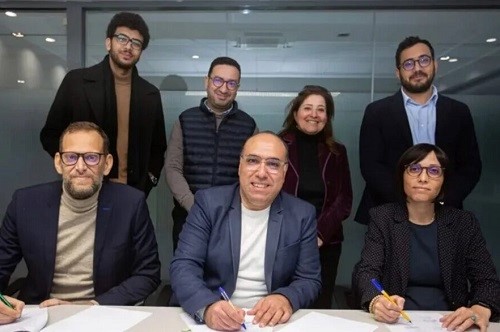
The amount of the funding has not yet been disclosed. The funds will be used to improve Juridoc’s technological infrastructure, optimize the performance of its AI-based search engine, enrich its database with legal content tailored to the local specificities of new markets, and support its sales and marketing efforts to accelerate the platform’s adoption.
By Adoni Conrad Quenum,
Editing by Feriol Bewa
Quickpay SA, which previously provided financial services through mobile platforms in partnership with banks, will now directly serve its customers, similar to its competitors. The fintech aims to expand its operations into new markets within the West African Economic and Monetary Union (WAEMU) beyond Senegal.
Fintech firm Quickpay announced on Monday, March 24, that it has secured an electronic money institution (EME) license from the Central Bank of West African States (BCEAO). A subsidiary of EDK Group, Quickpay will now be able to provide mobile financial services within the West African Economic and Monetary Union (WAEMU) directly, without relying on banking partners as it did previously.
"This license strengthens our position as a key player in financial inclusion and allows us to better meet the needs of our users by offering them tailored financial services. It thus contributes to the financial inclusion of unbanked populations, significantly supporting the economic development of the African continent, and more specifically of Senegal," the company said in a press release.
With this new authorization, Quickpay joins a limited group of entities licensed to independently issue and manage electronic money, alongside prominent players like Wave and Orange Finance Mobile, which currently dominate the Senegalese market. Quickpay's entry as a licensed EME into this expanding market could intensify competition and spur innovation. While Wave has gained traction through competitive pricing and user-friendly features, and Orange Money with its extensive network, Quickpay will need to differentiate itself by offering innovative, cost-effective services customized to local requirements.
According to a BCEAO report, the number of electronic money accounts within WAEMU increased significantly, from 94 million in 2020 to 131 million in 2021, representing a substantial 39% rise. During the same period, Senegal experienced a 63% surge in subscriptions, underscoring the growing demand for digital financial services.
Despite Senegal's rapid adoption of fintech solutions, a significant portion of the population remains unbanked, and disparities persist, particularly along gender lines. According to the GSMA report "State of the Industry Report on Mobile Money 2024," nearly 30% of women in Senegal still do not have a mobile money account, while adoption among men is nearly universal. This digital divide presents a major challenge that industry participants, including Quickpay, will need to address to ensure truly equitable financial inclusion.
By Samira Njoya,
Editing by Sèna D. B. de Sodji



